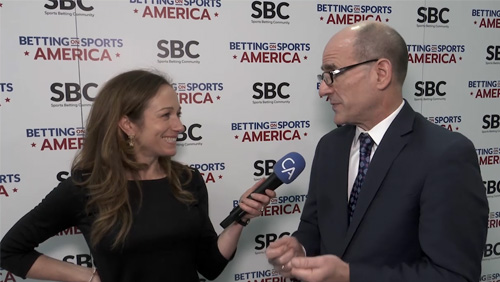The Wire Act continues to be a hot topic in the U.S. as the Department of Justice (DOJ) continues to go back and forth on when and how it should be enforced on gambling operations. To help understand the issue better, CalvinAyre.com’s Becky Liggero spoke with Mark Hichar, shareholder of Greenberg Traurig and legal expert on the topic, at the recent Betting on Sports America (BOSA) conference.
To get some context, Liggero asked Hichar to explain the history of the law and how we got to where we are. “The Wire Act is a 1961 law that’s always been ambiguous,” he said. “And in 2009-10, the lotteries in New York and Illinois petitioned the Department of Justice seeking some clarity whether the Wire Act applied to lotteries. And the Department of Justice issued a decision in 2011 doesn’t apply to lotteries, and in fact, the Wire Act applies solely to sports betting. So in reliance on that decision from the Department of Justice, state lotteries in many states made their games available to consumers on their mobile phones and personal computers, and the state of New Jersey and a few other states licensed commercial operators to put games online and make them available similarly on personal devices.”
Things got rocky when the DOJ went back on their 2011 decision. “In January, the Department of Justice issued a new opinion saying that our 2011 decision was wrong, and that the Wire Act now is interpreted to apply to all types of betting,” Hichar explained. “So that’s where we are now. You have several state lotteries that relied on the 2011 decision, and now they’re in a point of uncertainty saying, ‘How do we bring ourselves into compliance, or can we bring ourselves into compliance with the 2019 decision that just issued in January?’”
That’s caused a lot of turbulence in the American online betting sector. “In response to the what now question, the lottery in New Hampshire, along with two of its vendors, NeoPollard and Pollard Banknote, have sued the Department of Justice, disagreeing with the most recent interpretation and saying it should be vacated, and only the 2011 decision should apply,” he said. “So that’s one response. There could be legislative responses, but I think, in the immediate future, that’s unlikely.”
While there are lots of tricky questions to figure out in the fallout, Hichar is optimistic. “Generally there’s a lot of very motivated, very bright people in the gaming industry, so I have no doubt no matter what the obstacles, it will continue to expand,” he told Liggero.
Things are definitely getting better, and Hichar has proof of it, pointing to the BOSA conference as one example. “In April of last year, the idea of this sports betting conference would have been a figment of people’s imagination because it wasn’t until May of 2018 that the law was struck down that enabled states to choose for themselves whether there could be sports betting,” he said. “So, where there’s a will, there’s a way, and I think that gaming is expanding in the United States. And I think that one of the things that’s forgotten in this is that, regulated gaming protects consumers. You can regulate, people can regulate how much they play, you can determine whether or not there’s irregularities and whether or not some of the games are improperly being fixed and so forth.”
